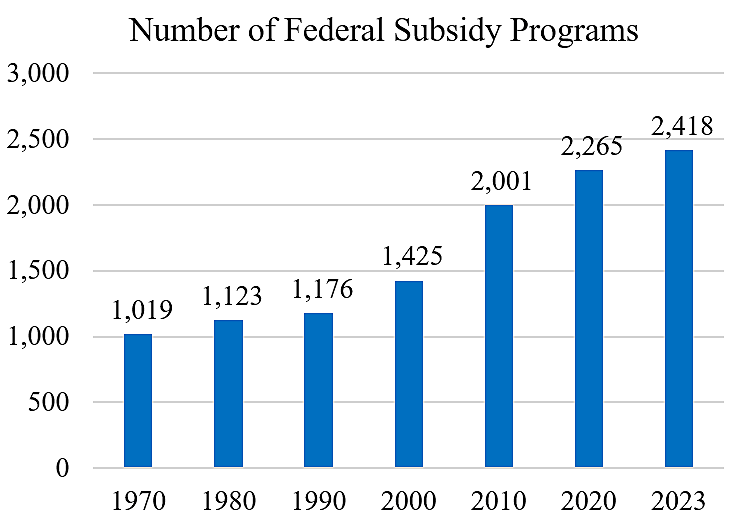
Chris Edwards
Federal government spending is soaring and debt will soon reach record highs compared to the size of the economy. Rising spending and debt are undermining growth and may push the nation into a financial crisis.
As the federal government’s size has expanded, the scope of its activities has also grown. The government subsidizes farming, health care, school lunches, broadband, rural utilities, energy, rental housing, aviation, passenger rail, public broadcasting, chip manufacturing, job training, foreign aid, education, urban transit, space exploration, and hundreds of other activities.
For decades, the government has published an official list of all its grant or subsidy programs for the states, businesses, nonprofits, and individuals. The list used to be called the Catalog of Federal Domestic Assistance but is now called Assistance Listings. The list is a rough indicator of the steadily expanding scope of federal interventions.
The chart shows that there are 2,418 federal grant or subsidy programs in 2023, more than double the number in 1990. Each new subsidy program requires higher taxes or more federal borrowing. Each subsidy generates a bureaucracy, spawns lobby groups, and encourages more special interests to demand handouts.
The rise in size and scope of federal subsidies means that Americans are losing their independence. State and local governments, businesses, nonprofits, and individuals that become hooked on subsidies become tools of the federal government. They have less incentive to work and innovate, and they shy away from criticizing government policies.
Let’s all celebrate July 4, but remember that the path to freedom and prosperity is to cut the size and scope of the federal government.
____________________________
Data Notes: Counts for 2020 and 2023 are from July listings under grantsgov here. Previous years were counts based on hardcopy and electronic versions of the Catalog of Federal Domestic Assistance. The new Assistance Listings keeps the same CFDA numbers. The counts should be considered only a rough measure of federal subsidies since what constitutes one program and one grant is rather loose.
An example of a new grant program is CFDA 20.939 for safe streets enacted in 2021. You can get a sense of the bureaucracy in this one new subsidy program reading the materials here and here. There is no reason for this new federal intervention, as the states themselves are in favor of safe streets and have their own revenue sources.




